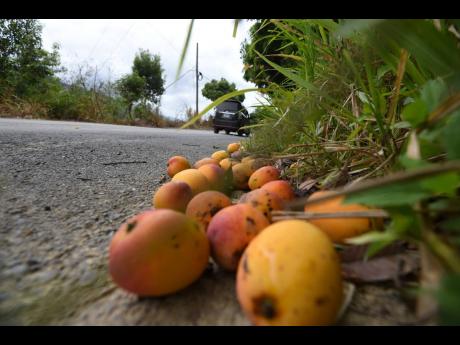Sharon Nelson | Harness the untapped potential of mango
Recently, Jamaica saw the establishment of a Mango Agro Park valued at nearly $100 million and there is a commitment to growing the fruit as reported in the news. The Agro Investment Corporation estimates an Internal Rate of Return of 59 per cent over a 10-year period for growing mangoes.
However, a potential source of well-needed foreign exchange is rotting in our backyards and this source should be harnessed for export. We need to see mango production as a viable business and give attention to the creation of a strong value chain. A chain with economic and strategic value to the agricultural sector and to our nation.
A value chain speaks to all the activities in the creation of a product or service. There are several players in the value chain in this market. Chey, Workenish and Shafera identified them as input suppliers, producers, local collectors, wholesalers, retailers, and consumers, where consumers can be local or international. The function of the input supplier is to provide different types of production inputs to mango producers. Producers cultivate and supply mango to the market through the collector. The collectors are farmers or part-time traders who collect mango for the purpose of reselling it to wholesalers, retailers and consumers. They use their financial resources and their local knowledge to buy bulk mango from the producers. They are major actors in the channel, and they purchase mango either directly from farmers or from orchards. Retailers purchase from collectors and deliver mangoes to consumers where consumers can be local or international.
Some years ago in the United States, I shopped for mangoes at a supermarket in Queens, New York, and observed the retail side of the value chain. This supermarket prided itself in catering to the Caribbean palate. It stocked a variety of mangoes that originated from all over the world. At the time, seeing this great variety, I took it upon myself to sample the offering. To my great disappointment, this variety lacked substance. They were not on the tasty, flavourful side that I was accustomed to, they lacked body and showed signs of their journey to Queens, New York. Sad to say there was a complete absence of the succulent Jamaican mango – no East Indian, and no St Julian. The international demand for Jamaican grown mangoes is great!
NUTRITIONAL VALUE
Mango is known as the king of fruits mangifera indica – the national fruit of India. It represents prosperity, abundance, and wealth. Each serving is fat, sodium and cholesterol free, a superfood, with 20 different vitamins and minerals.
GLOBAL MANGO TRADE
The global trade in mangoes has grown by an average of five per cent annually for the last 10 years, with India, China and Thailand being the main producers.
In nine out of the last 10 years, Jamaica’s export to the global trade was negligible, with zero mangoes sent to the American market and small amounts to the United Kingdom and Canada.
GAP IN THE MANGO VALUE CHAIN
It is reported that Jamaica resumed the shipment of mangoes to the United States in 2019, shipping some 8,151 kilogrammes of the fruit to that country after being absent since 1999.
Prior to the 2019 shipment, the USDA had previously given clearance for Jamaica’s mango exports in 2014. Part of the required process at that time was for the mangoes to undergo irradiation. Since then, it is reported that plans are in place for the construction of a hot water treatment plant for the washing of mangoes as a pest control measure.
PRODUCTION AND EXPORT
These actions are commendable and are steps in right direction. With a tropical climate and some 65 varieties of mangoes at our disposal, Jamaica has the opportunity to increase the worth of the value chain and improve the livelihood of each and every householder. Mango suppliers can be divided into three groups, namely orchard, small farmers and homeowners. Plans are in place for an increase in Jamaica’s mango production through orchards and through the agropark and the initial five investors, but we need to pay attention to the householder who has existing trees in his backyard and who might just be interested in becoming a supplier. Sensitisation to the requirements to grow mango for export, how to procure inputs cheaply and the requirements to adding value to the chain is needed at this time.
So where do we go from here?
We need to strengthen the value chain in a systematic and deliberate way. Emphasis should be placed on marshalling a cadre of knowledgeable local collectors, knowledgeable on the types, grades and standards, the pests and diseases affecting mango storage, conditions required, harvesting and post-harvesting techniques. Mango collectors need to replace garbage collectors as we build the mango value chain.
If this is done, we would not see the king of fruits rotting in our backyards, on our compounds or being placed in large bags for the garbage collectors. We were blessed with a very bountiful crop this season. Let mango collectors build a relationship with the producers and replace the garbage collectors who currently deal with the bags of mangoes that we place at our gates.
Producers should be sensitised on the marketing options available to them, the marketing system, the availability of quality input, harvesting techniques. All with a view to increasing the bargaining power of the producer.
The input supplier need to engage in research and development as to the type and quantity of input that is required for a Jamaican mango industry. We also need to learn from other countries like Trinidad and Tobago, our Caribbean neighbour. The choice is ours!
- Sharon Nelson is a Fulbright Scholar – climate change food and water security, senior lecturer of agricultural economics Caribbean Economic Environment at The University of Technology, Jamaica and former Programme Director of the Economics Division. Send feedback to columns@gleanerjm.com


